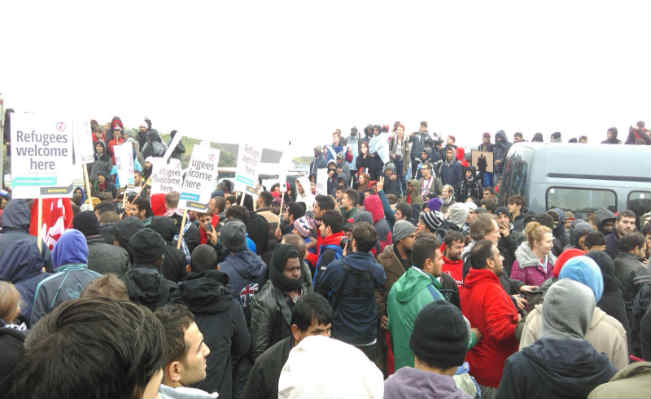 Photo by Shadia Edwards-Dashti
Photo by Shadia Edwards-Dashti
Shadia Edwards-Dashti reports on a delegation from England and Scotland to the refugee camp near Calais on Saturday
Driving toward the dark rain clouds that engulfed the horizons of the camp site, I was hit by the reality of chaos, poverty and crisis less than 100 miles from our more and more gentrified metropolis.
Approaching the camp, our delegation, organised by Stand up to Racism, was overwhelmed by greetings in all the different languages of the Middle East and North Africa. It was incredible that these people were welcoming us and gesturing us into their tents, given our country’s attitude.
The entrance is immersed in poverty, and going inside it gets worse and worse. The smells of some areas made me feel sick. But the community spirit that the camp maintains was beautiful to see. A shanty town community has been created. There are shops and restaurants in some tents, a library and even a shisha café. But all laden in mud and squalor.
Walking through the camp, I was told by Nizar, an Iranian refugee, that over 6,000 refugees of many different nationalities including Iranian, Afghani, Libyan, Iraqi, Kuwaiti, Sudanese and Syrian live in the camp. He told me that in the Afghani and Iraqi quarters of the camp six refugees died during the night.
‘Jungle is haram’
As the rain began to pour down, over 500 people assembled for a rally at the entrance of the camp, where refugees spoke about the dire conditions they face. They tell us, jungle is ‘haram’ and they tell us jungle is ‘no good’, but mostly they tell us that they are not ‘animals’. And that is why I refuse to call the camp a jungle.
Activists and representatives from our delegation from London and Glasgow, also shared welcoming messages and condemned David Cameron for his atrocious border control policy. In unity, the crowd bellowed “OPEN THE BORDER,” and “NO JUNGLE, NO JUNGLE!”
Regardless of linguistic ability, this was universally understood. Despite 100,000 people demonstrating in London with the same chants, somehow even our prime minister, leader of a so-called ‘liberal democracy’, cannot heed our message. We remind one another of who created this crisis; Britain’s wars destroyed their real homes and our filthy refugee policy generated these putrid conditions.
As the speeches continued, I was offered a handmade cigarette by the man stood next to me. Suddenly I was overwhelmed and could not contain my tears. Perhaps it was the gesture of offering, the kindness of simplicity, or a combination of his generosity vis-à-vis the stinginess of London. I began to cry. My tears were masked by the rain and they were unnoticeable but knowing that even emotion and tears are expressions of the privileged, I forced myself to stop. This is their life and tears just don’t wash that away.

‘Tomorrow, I will try again’
As the rally came to a close, we marched approximately three miles to the port of Calais. Here I met Ali and Farhany. Ali is 23 and from Iraq and Farhany is 29 from Turkey. Both have lived in the Calais camp for over three months. As we ran away from the police, Ali carried my bag and Farhany carried me.
They were protective of me, accepted me and welcomed me. Seeking refuge in a safe spot I explained that my father came to London from Bahrain 40 years ago, they were enthusiastic and excited that there is an element of hope and a possibility of success on the borders of Britain. Ali explained to me that Farhany has attempted to cross the border five times, each time being chased by dogs and thrown back into the camp by the police.
They howled with laughter as his resilience and determination cannot be quashed. He says tomorrow he will try again. And he promised me by 30 he will be free.
‘He is my Family Now…’
We Skyped Ali’s mother who is still in Iraq, I waved and she told me, “Shrokran, shokran, shokran.” Suddenly, after a loud noise, the phone cut out. Ali said “Don’t worry, it’s not a bomb…!” Their humour clearly being a way of maintaining sanity and finding release and escape.
I asked Farhany where his family was, and he said “I lost them, they are dead…” Silence followed while a combined state of paralysis incapacitated Ali, Farhany and I. I’ve never been unable to respond to somebody, but I genuinely could not think of a single thing to say to Farhany. What words could possibly comfort him after telling me that.
Contemplating what he’d just said, I couldn’t imagine the strength it took to continue with life, and still be so determined to strive for something better. Finally breaking the silence, he pulled Ali in towards him and said “he is my family now.”
This space is for them
Saying goodbye to Ali and Farhany was very difficult, not knowing whether they would be safe or even alive. They walked me back to my coach and laughed and said can we sit next to you? As the door shut on the coach I couldn’t quite comprehend that I was leaving them.
Arriving at the Calais Dover port, we were told that there was a two-hour delay due to “an unforeseen protest earlier at the port.” The message our delegation sent to authorities in Britain and France is to expect many more of such acts. We will be back to campaign and fight and stand, literally shoulder to shoulder – or in my case on Farhany’s shoulders – in solidarity and in unity with the refugees.
So here I am waiting to travel back to the luxury that is my life. The seat next to me is vacant. This space should be for them. Yet, Ali, Farhany and 6,000 others still wait in Calais, at the borders of humanity.

